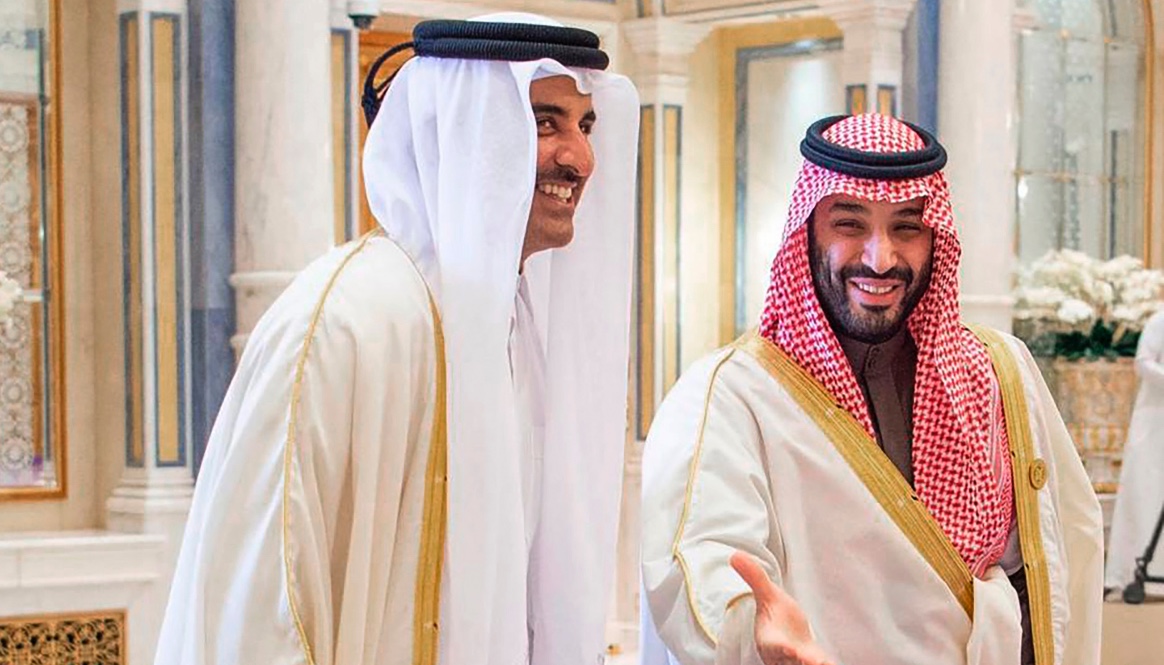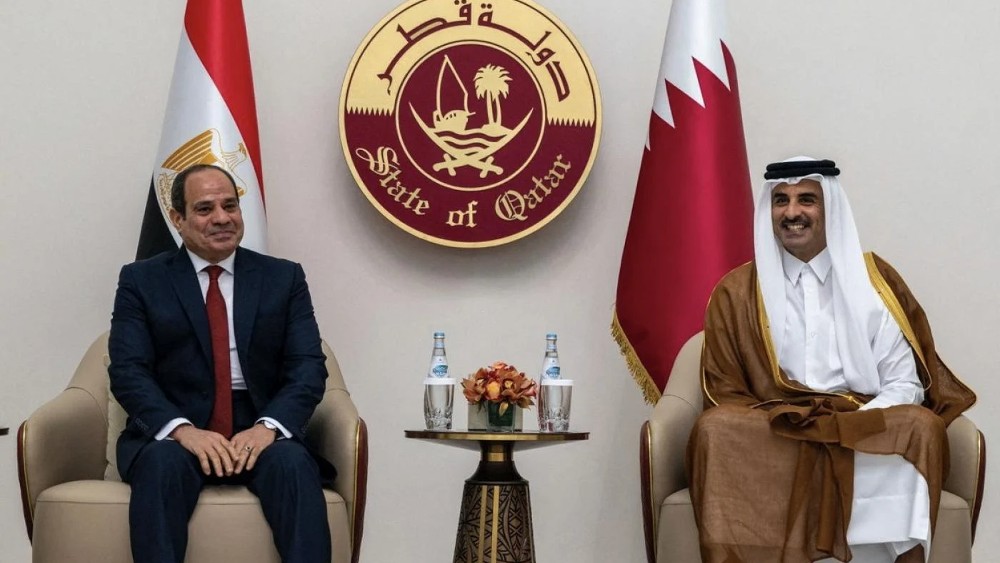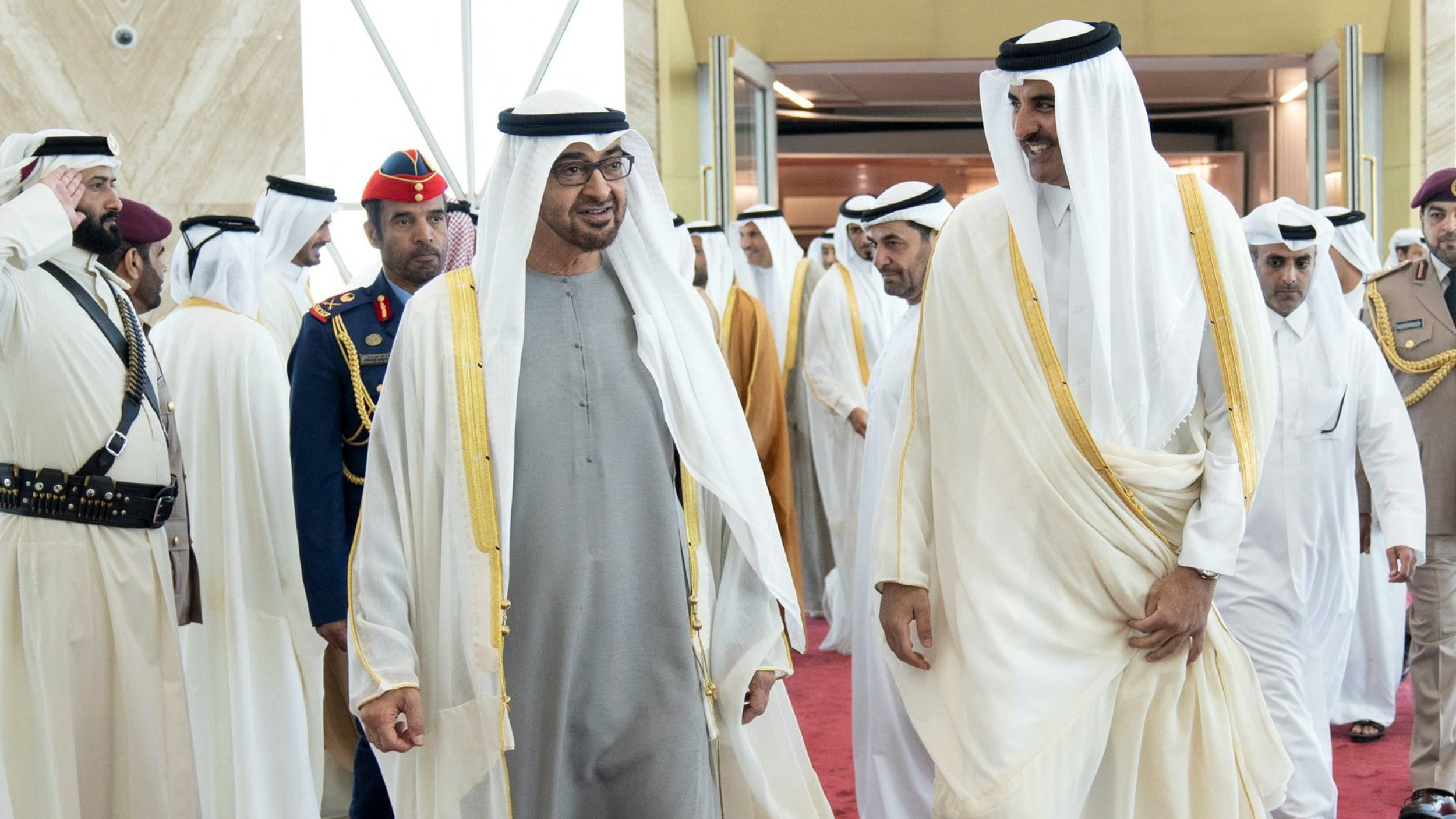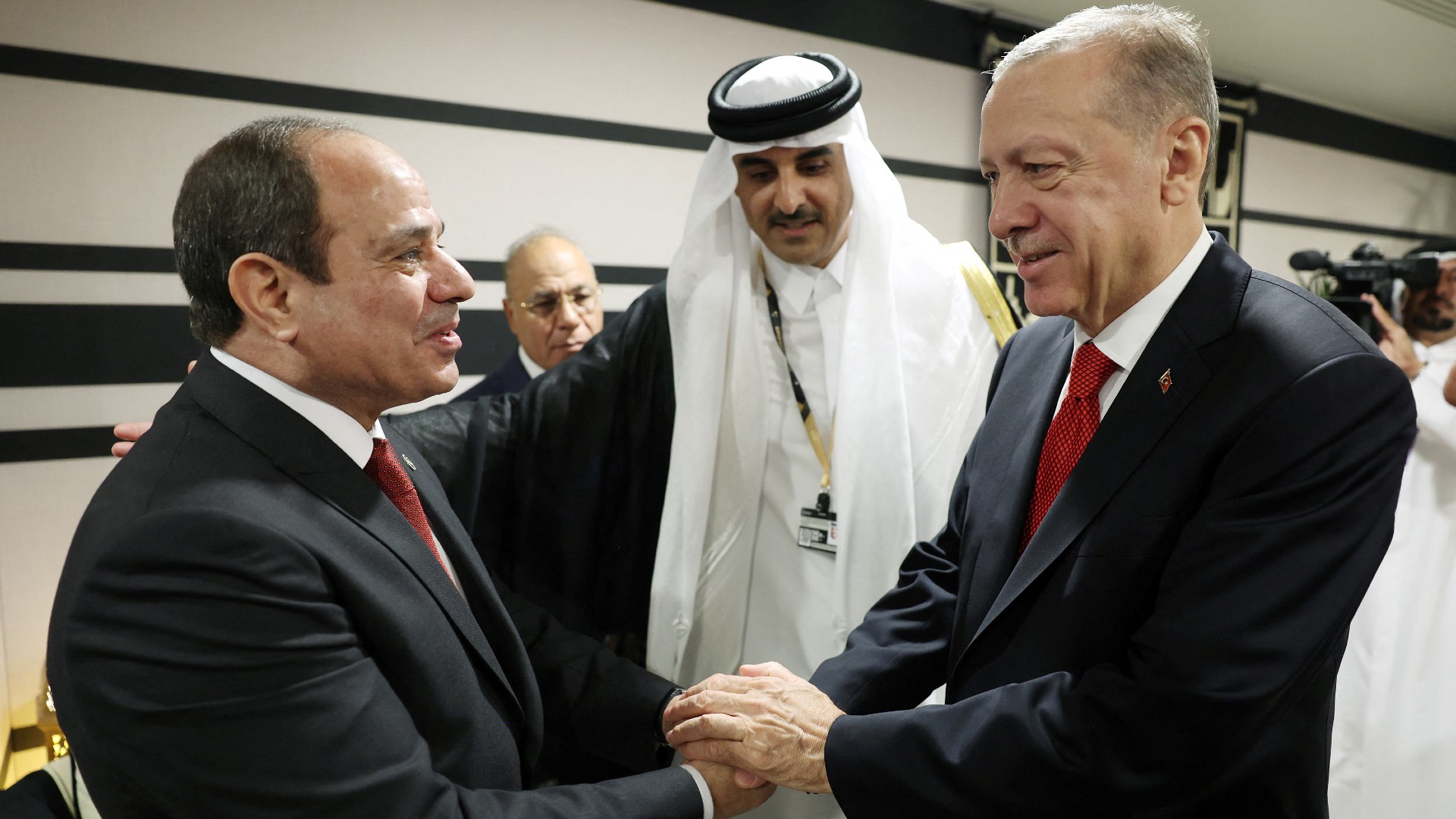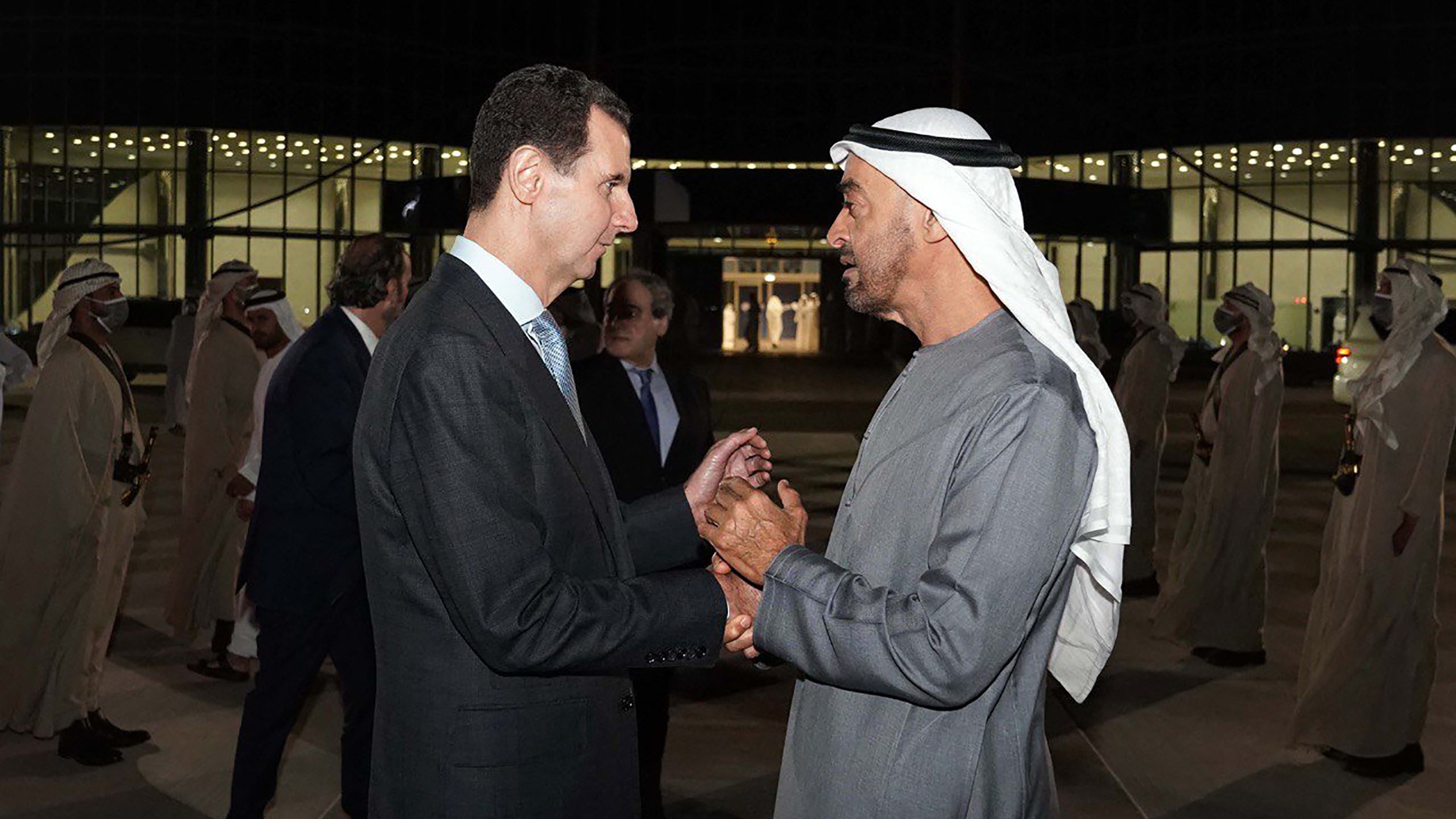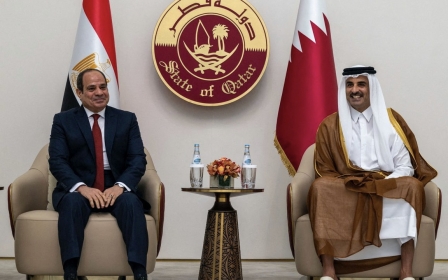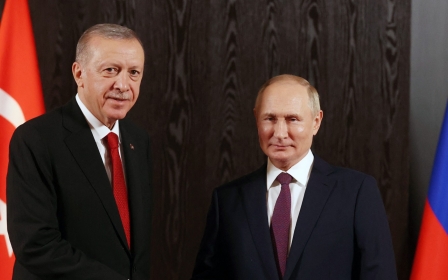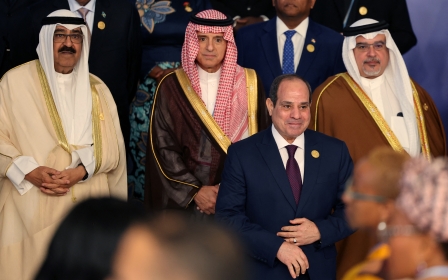The Middle East's year of pragmatism over politics
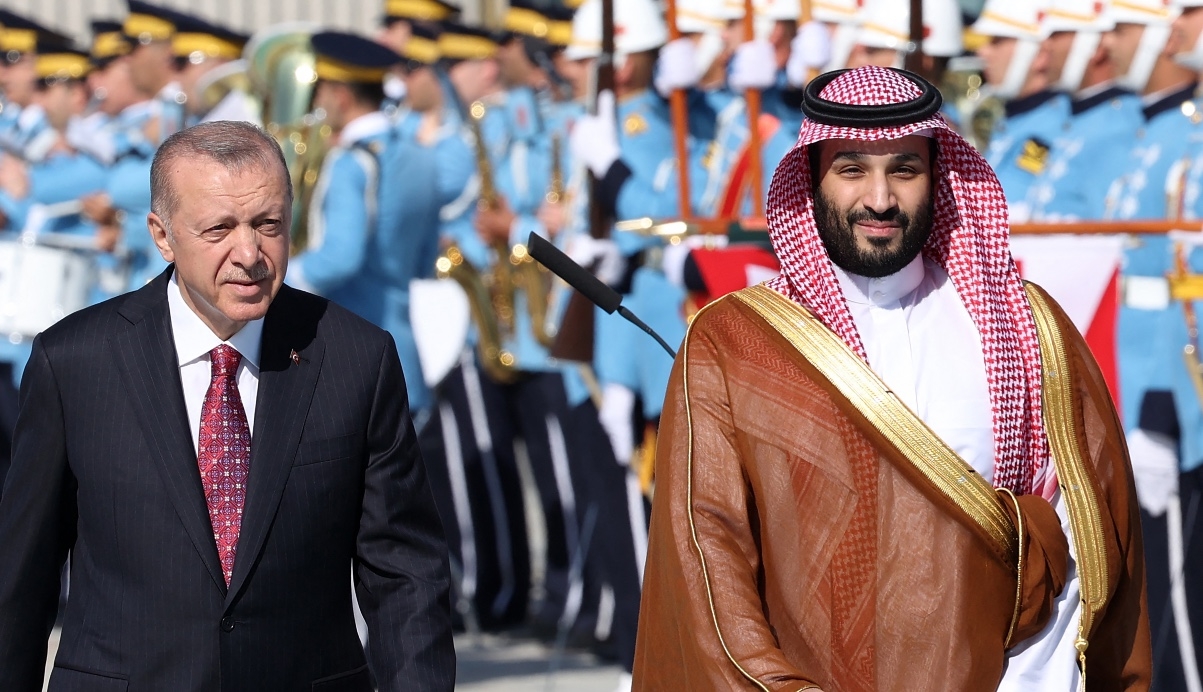
In 2022, Middle Eastern leaders smiled for photo-ops with once-bitter foes and jetted off on glitzy state visits that would have been unthinkable a few years ago.
The bonhomie was on display from Ankara and Cairo to Dubai and Doha, extending from Syria's pariah President Bashar al-Assad to hereditary Gulf rulers flush with a windfall of petrodollars on the back of Russia’s invasion of Ukraine.
“This year the fatigue over disputes that have teared at the region for a decade kicked in,” Abdullah Baabood, a nonresident scholar at the Malcolm H. Kerr Carnegie Middle East Center, told Middle East Eye.
“It’s a surprising turn of events and of course, it's a positive for the region which has been starved of dialogue," he added.
'Familial and tribal ties connect the Gulf. It is in the national interests of countries to deescalate tensions'
- Gulf diplomat
The diplomatic blitz kicked off in February with Turkish President Recep Tayyip Erdogan paying his first official visit to the UAE in nine years. Erdogan followed up with a visit to Saudi Arabia in April and later hosted onetime Gulf foe, Crown Prince Mohammed Bin Salman, on his home turf in Ankara.
New MEE newsletter: Jerusalem Dispatch
Sign up to get the latest insights and analysis on Israel-Palestine, alongside Turkey Unpacked and other MEE newsletters
Turkey had been at loggerheads with the Gulf states since the 2011 Arab Spring, when Erdogan threw his weight behind the Muslim Brotherhood, Islamists, and democratic movements that the absolute monarchies consider a threat to their rule. The enmity with Saudi Arabia was at its apex when Jamal Khashoggi was murdered at the Saudi Consulate in Istanbul - a killing reported to have been personally ordered by the crown prince.
But this year, analysts say, economy trumped ideology for Erdogan, who is seeking re-election in June amid an economic crisis that has seen inflation shoot above 80 percent. Both Riyadh and Abu Dhabi have pledged billions of dollars to prop up Turkey's flagging foreign currency reserves and made investments in the country.
“The economy is a huge problem for Erdogan,” Ken Katzman, a senior advisor at the Soufan Group, told MEE. “He is trying to get back into good graces with the Gulf as he reaches out for a financial lifeline.”
On the other side of the dispute is Egypt, another financially beleaguered country that has reset ties with old foes.
Turkey and Qatar backed the democratically elected government of Mohamed Morsi, whose removal by Egypt's military brought President Abdel Fattah el-Sisi to power. Relations between the countries broke down soon after. Erdogan openly questioned Sisi's legitimacy, while Cairo accused Qatar of interfering in its internal affairs, using the state-funded Al Jazeera news network to attack it in the press.
In 2017, Egypt signed onto a Saudi-led boycott of Qatar over the country's support for the Muslim Brotherhood and Islamist movements that Riyadh and its allies labelled “terrorists”. Qatar denied the allegations.
'Qatar will slowly become more active geopolitically, after laying low during the World Cup'
- Cinzia Bianco, European Council on Foreign Relations
Fast forward to 2022 and Erdogan is clasping hands with Sisi at the World Cup, while Egypt's leader has been pictured smiling next to Qatar’s ruling emir, Tamim bin Hamad Al Thani.
Qatar has joined Saudi Arabia and the UAE in pledging billions of dollars to support Egypt's crumbling economy through investments and Central Bank deposits.
The Gulf states are putting aside old grudges at the same time the war in Ukraine lifts energy prices, filling their coffers with petrodollars and boosting their influence over economically weaker countries like Egypt and Turkey.
“The biggest event of the year, Russia's invasion of Ukraine, has helped the Gulf in many ways," Baabood said.
“Sisi’s supporters in the Gulf are not necessarily happy with his handling of the economy, and Qatar’s financial backing doesn’t mean Doha agrees with Sisi on everything,” Baabood, from the Carnegie Middle East Center, said.
“[But] there is a fear that the Egyptian economy is going to collapse with potentially destabilising repercussions across the entire Middle East,” he added.
The Qatar-hosted World Cup has given Middle Eastern leaders a high-profile format to express the shift in their approach to the region for the entire world to see.
During the tournament, Saudi Arabia’s Crown Prince Mohammed Bin Salman was seen sporting a scarf in the colours of the Qatari flag. Qatar's emir reciprocated by draping a Saudi flag around his shoulders.
“The flag wearing was symbolic. It sent a message to audiences in the region and the West,” a Gulf diplomat told MEE, “but it's more than a gesture."
"The commitments to normalise relations are real," the diplomat added. "Familial and tribal ties connect the Gulf and it is in the national interests of countries to de-escalate tensions.”
Cinzia Bianco, a visiting fellow at the European Council on Foreign Relations, told MEE that the Saudi-Qatar rapprochement was “quite genuine”, adding that it was “driven by a mutual realisation that geopolitical coordination is a core interest for both sides”.
Analysts expect regional powers to continue mending ties in 2023, but warn that differences will persist.
“These are all hereditary Gulf rulers, but they do not have similar views on the region," Katzman said.
“MBS and MBZ are skeptical of the Muslim Brotherhood, but Qatar still believes in bringing the Islamists into the tent,” Katzman added, addressing the rulers of Saudi Arabia and the UAE by their acronyms.
Relations between Qatar and Bahrain remain tepid. Meanwhile, Doha’s rapprochement with the UAE has been bumpier compared to its reconciliation with Saudi Arabia, despite Emirati President Mohammed bin Zayed’s visit to Qatar in December.
In 2022, Qatar was primarily focused on hosting the World Cup, "[But] they will slowly become more active geopolitically, after laying low during the tournament to prevent any instability,” Bianco, from the European Council on Foreign Relations, said.
As Qatar reasserts itself, there will be room for cooperation with Saudi Arabia in areas like the horn of Africa where the two countries' interests converge, Bianco believes, but she sees potential flashpoints between Qatar and the UAE over Turkey, where both are looking to scoop up bargain investments, and Afghanistan.
In September, the UAE snagged a contract to run Kabul airport, which Qatar and Turkey were eyeing.
Syria remains a point of contention between regional powers. Erdogan has unsuccessfully made overtures to President Bashar al-Assad. In March, the UAE welcomed the Syrian leader for his first visit to an Arab country since the Syrian war erupted. Qatar and Saudi Arabia, however, are hesitant to bring Damascus back into the Arab fold.
“Syria is just one of the cleavages that the region has to contend with,” Katzman said, who believes the wave of rapprochement could be tested in 2023 if there is a flare-up in hotspots such as the besieged Gaza strip, where Qatar's support for Hamas continues to rile Gulf neighbours like the UAE.
Israel hasn't been left out of the regional thaw. It is being courted by Turkey's Erdogan and has cemented ties to Abraham Accord states, signing a historic free trade deal with the UAE and boosting arms exports.
'Rapprochement is gaining steam and will continue in 2023'
- Abdullah Baabood, Carnegie Middle East Center
Israeli military officials have even been dispatched to Qatar, which welcomed Israeli flights for the World Cup despite the two's absence of formal ties.
“If there is an overall winner in the region it is Israel," Baabood said.
The Gulf states are also divided on how to manage ties with Israel's arch-nemesis, Iran.
Qatar, which shares the world’s largest natural gas field with Iran, is a proponent of closer engagement and hosted talks to revive the 2015 nuclear deal earlier this year.
While the UAE and Saudi Arabia opposed the agreement, they have made some overtures to the Islamic Republic recently.
In August, the UAE reappointed its ambassador to Iran. The decision came after missiles and drones fired by Iran-aligned Houthi rebels in Yemen hit Dubai and Abu Dhabi, raising the alarm among Emirati leaders about Washington's commitment to their security.
“Saudi and Emirati outreach to Iran is motivated by them not knowing what the US will do if they are attacked,” Katzman said.
But Gulf outreach has cooled as Iran is convulsed by protests calling for the government's downfall. Iraqi officials said on Monday that talks between Saudi Arabia and Iran in Baghdad, which included negotiations over the war in Yemen, have stalled because of the demonstrations.
“Looking into 2023 if the protests in Iran continue, dialogue with Saudi Arabia will slow,” Baabood said.
But analysts expect the general trend of warming ties among Gulf powers and Turkey to persist.
“Leaders went into conflicts after the Arab Spring thinking they would achieve something, but after a lot of effort and costs, they didn’t achieve much," Baabood said.
“There are still going to be points of friction, but rapprochement is gaining steam and will continue in 2023,” he added.
This article is available in French on Middle East Eye French edition.
Middle East Eye delivers independent and unrivalled coverage and analysis of the Middle East, North Africa and beyond. To learn more about republishing this content and the associated fees, please fill out this form. More about MEE can be found here.


